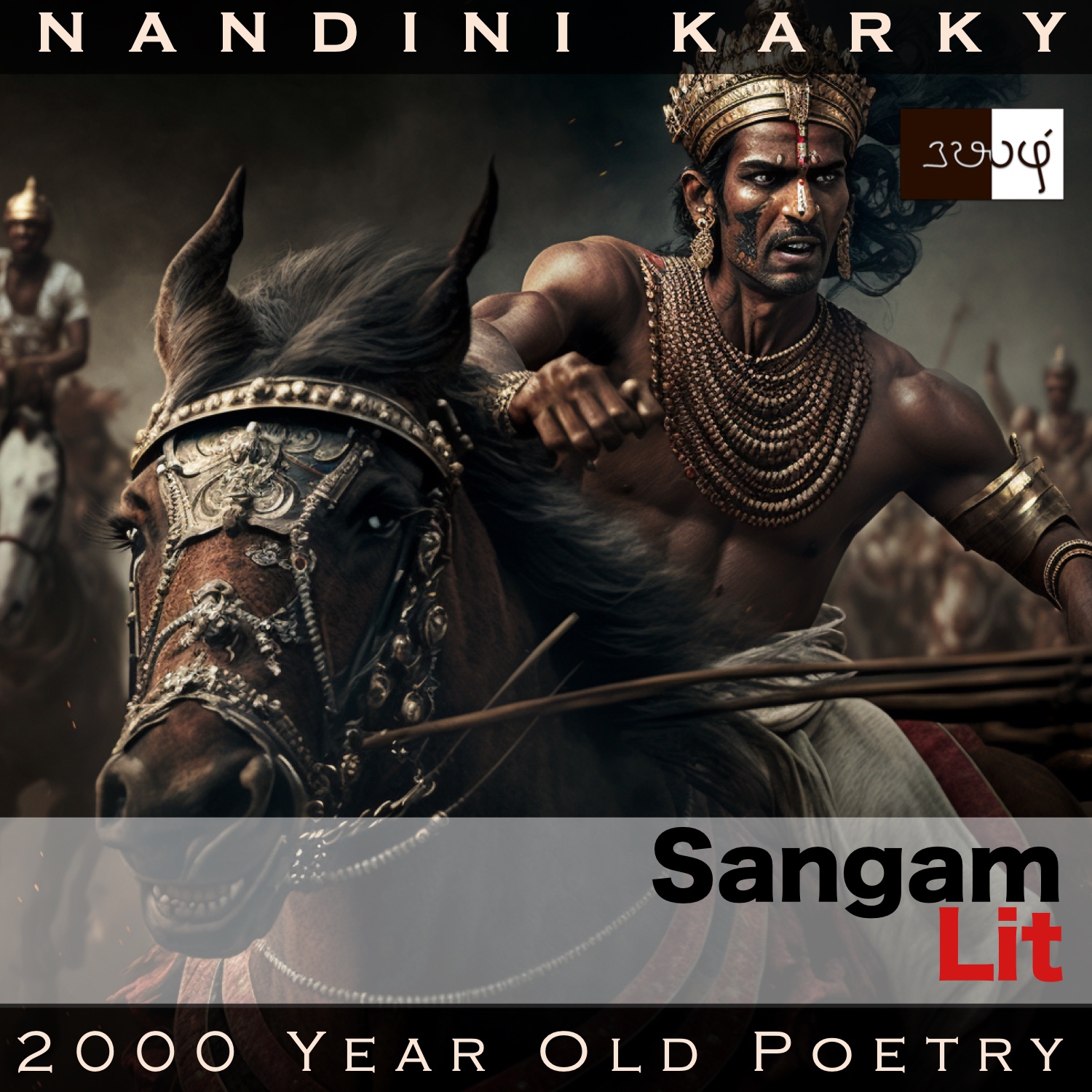Podcast: Play in new window | Download
Subscribe: Apple Podcasts | Spotify | Amazon Music | Android | iHeartRadio | Email | TuneIn | RSS | More
In this episode, we hear of the fall of the enemy’s ego and the rise of a king’s might, as depicted in Sangam Literary work, Puranaanooru 78, penned about the Pandya King Thalaiyaalankaanathu Cheruvendra Nedunchezhiyan by the poet Idaikundroor Kizhaar. The verse is situated in the category of ‘Vaagai Thinai’ or ‘King’s victory’ and talks about the disastrous defeat of enemy kings.

வணங்கு தொடைப் பொலிந்த வலி கெழு நோன் தாள்,
அணங்கு அருங் கடுந் திறல் என்னை முணங்கு நிமிர்ந்து,
அளைச் செறி உழுவை இரைக்கு வந்தன்ன
மலைப்பு அரும் அகலம் மதியார், சிலைத்து எழுந்து,
‘விழுமியம் பெரியம், யாமே; நம்மின்
பொருநனும் இளையன்; கொண்டியும் பெரிது’ என,
எள்ளி வந்த வம்ப மள்ளர்
புல்லென் கண்ணர் புறத்தில் பெயர,
ஈண்டு அவர் அடுதலும் ஒல்லான், ஆண்டு அவர்
மாண் இழை மகளிர் நாணினர் கழிய,
தந்தை தம் ஊர் ஆங்கண்,
தெண் கிணை கறங்கச் சென்று, ஆண்டு அட்டனனே.
A song detailing another aspect of the Thalaiyaalankaanam battle and the Pandya king’s resounding victory. The poet’s words can be translated as follows:
“Having handsome and curving knee joints, stride his sturdy legs, full of strength. He has a harsh and rare skill that is terrorising, that lord of mine! Akin to a cave-dwelling tiger that rises and stretches its legs in preparation to hunt its prey, he came upon that battlefield. Those who did not respect his broad chest, seemed to rise up with a loud shout, declaring, “Our armies are huge and skilled; He is but a mere youngster; Our victory shall be tremendous.” Those enemy soldiers came there mocking him but he made those dull-eyed men retreat showing their backs. Instead of killing them right there, he drove them to the town of their forefathers, and making their bejewelled women lament in shame, as clear drums resounded, there, he ended their lives! “
Let’s explore what the poet narrates in this song! He starts by describing the handsome and robust appearance of the king, focusing on his knee joints and legs. Then, to etch the king’s stance clearly, the poet talks about the way a tiger, after resting well for a long time in the quiet of its cave, when it decides it’s time to hunt, stands up and stretches its limbs, and then strides with confidence, in the direction of its prey. This is how the king approached the battlefield, the poet says. However, not understanding such a king’s might and skill, hordes of enemy kings and soldiers declared, ‘Behold the power of our combined armies. Besides, our opponent is but a young chap. There is not even a shred of doubt that we will destroy him’. To their utter shock, single-handedly, that king made them run showing their backs in the battlefield – a thing of shame for any warrior. Also, to die on the battlefield is honourable for those soldiers but the king wouldn’t end their lives there but instead chased them to their very towns, the seat of their ancestors, and as their women watched and cried in shame, as drums proclaimed his victory to the world, there, the Pandya king put them to death, the poet concludes.
An instance in history which clearly states a fight is never won until it is, and what a fall underestimating the opponent shall lead to! Seven kings, combined strength of seven armies, all well-versed in battle and mature in their years, while their opponent, a mere boy, who could hardly have had any battle experience. The odds does seem to favour the seven but life is full of surprises and what happened was that the ego of those seven kings met a shameful defeat. Taking this scenario and applying it to our everyday lives, where often our only enemy is ourselves, when we look at the tasks we set out to do, we will know the clear path to arriving at our destination is paved by never underestimating the magnitude of what lies before us!




Share your thoughts...